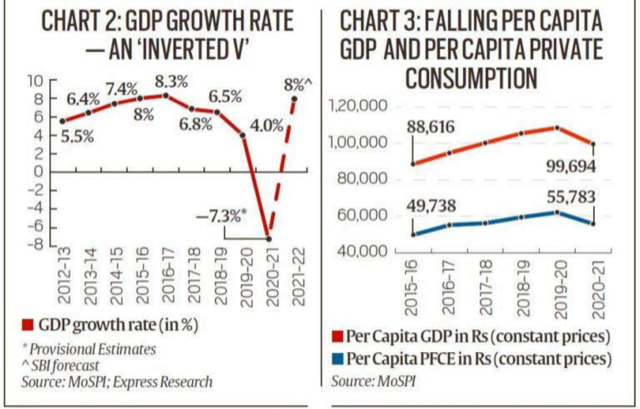| Gross Domestic Product |
- After the decline in the wake of the Global Financial Crisis, the Indian economy started its recovery in March 2013
- This recovery turned into a secular deceleration of growth since the third quarter (October to December) of 2016-17.
- The GDP growth rate steadily fell from over 8% in FY17 to about 4% in FY20, just before Covid-19 hit the country.
- Demonetisation on November 8, 2016 is seen by many experts as the trigger that set India’s growth into a downward spiral.
- India’s GDP growth pattern resembled an “inverted V” even before Covid-19 hit the economy.
|
| GDP per capita (GDP divided by the total population) |
- As the red curve in Chart 3 (above) shows, at a level of Rs 99,700, India’s GDP per capita is now what it used to be in 2016-17 — the year when the slide started.
- As a result, India has been losing out to other countries. A case in point is how even Bangladesh has overtaken India in per-capita-GDP terms
|
| Unemployment rate |
- This is the metric on which India has possibly performed the worst.
- Unemployment was at a 45-year high in 2017-18 — the year after demonetisation and the one that saw the introduction of GST.
- Then in 2019 came the news that between 2012 and 2018, the total number of employed people fell by 9 million — the first such instance of total employment declining in independent India’s history.
- As against the norm of an unemployment rate of 2%-3%, India started routinely witnessing unemployment rates close to 6%-7% in the years leading up to Covid-19. The pandemic, of course, made matters considerably worse.
|
| Inflation rate |
- After staying close to the $110-a-barrel mark throughout 2011 to 2014, oil prices (India basket) fell rapidly to just $85 in 2015 and further to below (or around) $50 in 2017 and 2018. This fall allowed government to tame the high retail inflation in the country.
- But since the last quarter of 2019, India has been facing persistently high retail inflation. Even the demand destruction due to lockdowns induced by Covid-19 in 2020 could not extinguish the inflationary surge
- Going forward, inflation is a big worry for India.
|
| Fiscal deficit |
- On paper, India’s fiscal deficit levels were just a tad more than the norms set, but, in reality, even before Covid-19
- In the Union Budget for the current financial year, the government conceded that it had been underreporting the fiscal deficit by almost 2% of India’s GDP.
|
| Rupee vs dollar |
- A US dollar was worth Rs 59 in 2014. Seven years later, it is closer to Rs 73.
- The relative weakness of the rupee reflects the reduced purchasing power of the Indian currency.
|

